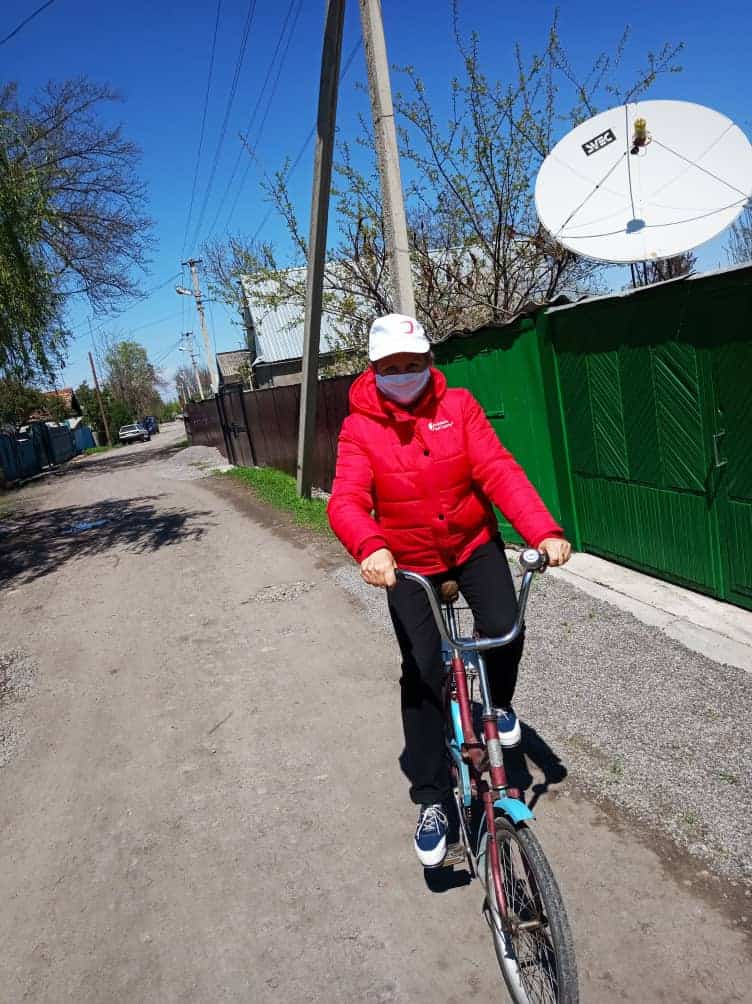Kyrgyz Nurses Provide Psychological Support and More for People with Tuberculosis
October 9th, 2020 | story
“It all began with a decision of the Chui office director of the National Red Crescent Society, who said, ‘Elena, you can handle it’ and now I’ve been handling it for 19 years.”
Elena Sorokina, a patronage (community) nurse for the National Red Crescent Society (NRCS) in Kyrgyzstan, has been helping patients with tuberculosis (TB) since 2001. The NRCS, a subgrantee of the USAID Cure Tuberculosis project, works with migrants, people who have been incarcerated, and people who are homeless, inject drugs, or misuse alcohol. Elena helps people who are likely to refuse or discontinue treatment adhere to their regimen by providing medical advice and psychological support. Most of her patients complete treatment.
Elena doesn’t have a formal background in psychology, but her work requires knowledge and skills to calm, encourage, or persuade patients. She has had training in interpersonal communication but relies mostly on her previous work experiences to build relationships with patients. Elena is determined to follow all her cases, no matter how difficult they are. Is it professional pride? “Perhaps,” she says; she can’t recall a case she refused or abandoned during the course of treatment, even when it took a toll on her own mental and physical health.
When I first contact them, most patients are depressed, experiencing self-stigma, and avoiding others. They wonder why someone would be interested in them when everyone else turned away. When patients eventually thaw, they talk about their problems and achievements. Most importantly, we rejoice together when they recover!” says Elena.
One such case was a man who had a poly-resistant form of TB, aggravated by alcohol abuse and psychological problems. A former military member who served on a mission to Afghanistan, the man was aggressive to medical workers. Instead of refusing to take this challenging patient, Elena visited him daily to deliver drugs and offer psychological support. Slowly, she built his trust and persuaded him to continue treatment. His adherence improved significantly, and he became calmer. But the stress of caring for him was so great that while doing so, Elena herself had to take sedatives. In September 2020, the man completed treatment, and though he gave Elena only a brief thank you, she believes it was a major win.
Another of Elena’s patients recovered from spinal tuberculosis in September. This patient lost her husband to COVID-19 during her illness and didn’t want to continue treatment. She was in a deep depression, and Elena visited her every day to bring medicine and provide counsel. At a recent TB support group meeting, the woman acknowledged that she had been lost and angry and wanted Elena to go away, but she was now thankful for Elena’s perseverance and for staying by her side during those difficult times.
Elena has learned not to take aggression or insults personally. “I’m not offended by this! It hurts far more when a person takes treatment seriously but fails to recover.”

More patients with more complex cases are referred to an NRCS psychologist who can diagnose clinical cases of mental or nervous diseases that require the involvement of psychiatrists and neuropathologists. Approximately one-fifth of all TB cases supported by the NRCS patronage nurses in Chui and Talas Oblasts require professional psychological support.
Individual and group psychological support for patients and their families has been especially critical during the pandemic. The threat of co-infection (TB patients are at high-risk for COVID-19), combined with the need to stay at home, income and personal losses, and other adverse effects of the pandemic put many patients under extreme psychological pressure. Patronage nurses continued to provide both in-person and online individual psychosocial support and counseling to complete TB treatment and avoid coronavirus infection. During the height of the pandemic, most monthly TB support groups for patients and their families were held online. The in-person meetings resumed in September.
TB patients appreciate the help of the patronage nurses and credit their support as a key factor to treatment adherence, and many remain in contact with their nurses. “Constant communication and attention from a Red Crescent patronage nurse and the desire to recover helped me to continue treatment. I can take the medicines myself, but you need to keep in touch with medical workers if you want to ask something or take tests, and receiving attention helps a lot mentally,” says a 37-year-old female patient.
This has been an extremely difficult year for patronage nurses. The COVID-19 emergency tested their commitment and determination, too. Many showed exhaustion and needed professional guidance to continue supporting their patients. The NRCS contracted a psychologist to help the nurses cope with work challenges and manage their professional and personal lives. NRCS also plans to offer the patronage nurses training on psychosocial support to improve their capacity to care for patients.
We strive to build lasting relationships to produce better health outcomes for all.